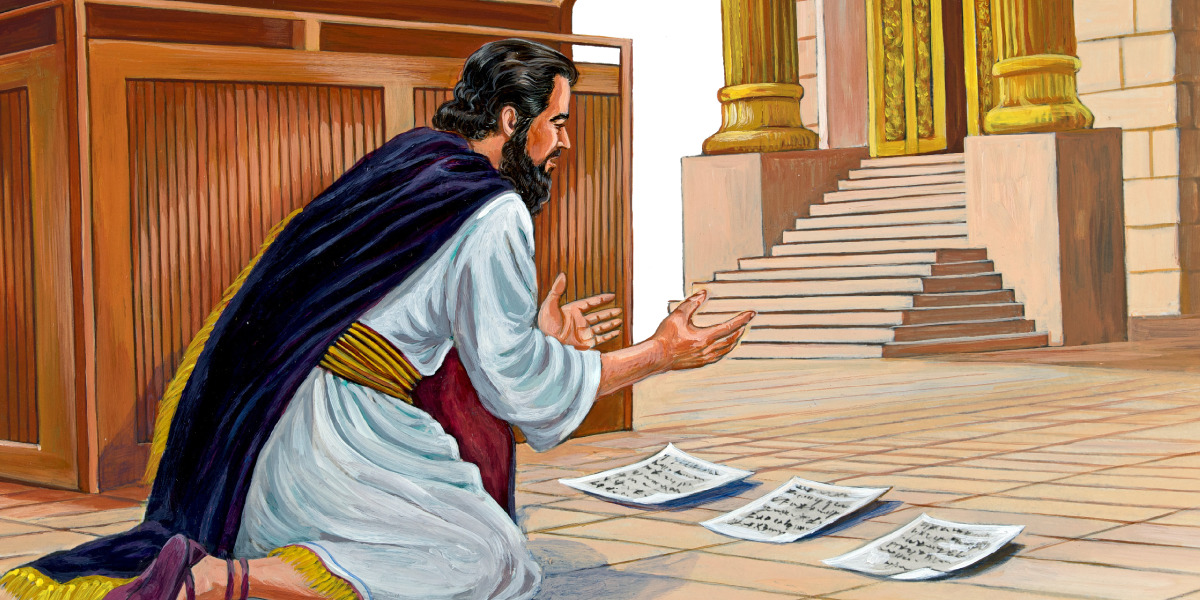LESSONS FROM THE LIFE OF KING HEZEKIAH 借鑑希西家王的一生

Chad Dollahite
Translation & Edition 編譯: Joyce Yang
King Hezekiah reigned over Judah during the time when Israel was divided into two kingdoms: Israel in the north and Judah in the south. The Bible devotes a considerable amount of text to Hezekiah – the Biblical record of his reign spans 11 chapters and 302 verses (2 Kings 18-20; 2 Chronicles 29-32; Isaiah 36-39).
希西家王在以色列分裂為兩個王國的時候統治猶大:北部國為以色列,南部的國為猶大。聖經用了相當多的文字來描述希西家——聖經對他統治的記錄跨越了11章和302節經文(列王紀下18-20;歷代志下29-32;以賽亞書36-39)。
The name Hezekiah is Hebrew for “Jehovah has strengthened” or “he who Jehovah strengthens.” God certainly did strengthen Hezekiah: “The LORD was with him; he prospered wherever he went” (2 Kings 18:7). God strengthened Hezekiah because “he did what was right in the sight of the LORD” (2 Kings 18:3). The Bible also says, “He trusted in the LORD God of Israel, so that after him was none like him among all the kings of Judah, nor who were before him. For he held fast to the LORD; he did not depart from following Him . . .” (2 Kings 18:5, 6).
希西家這個名字是希伯來語,意思是“耶和華堅固了”或“耶和華堅固的人”。神確實堅固了希西家:“耶和華與他同在,他無論往何處去盡都亨通。他背叛、不肯事奉亞述王。”(列王紀下18:7)。神堅固希西家,因為“希西家行耶和華眼中看為正的事”(列王紀下18:3)。聖經還說:“希西家倚靠耶和華以色列的神,在他前後的猶大列王中沒有一個及他的。因為他專靠耶和華,總不離開……”(列王紀下18:5, 6)。
Hezekiah was not an idle king. Like a few other kings in Judah, he was a reformer. And after the reign of Hezekiah’s wicked, idolatrous father Ahaz, much reform was needed (see 2 Kings 16:1-4). Hezekiah worked diligently to remove idolatry from the kingdom (2 Kings 18:4; 2 Chronicles 31:1). In his purging of idolatry, Hezekiah destroyed the brazen serpent Moses fashioned in the wilderness (see Numbers 21:4-9). The serpent had apparently been kept by the children of Israel since that fateful day in the wilderness, but it had become an idolatrous object, so Hezekiah broke it in pieces (2 Kings 18:4).
希西家不是一個無所事事的國王。像猶大的其他幾個國王一樣,他是一個改革者。在希西家邪惡、拜偶像的父親亞哈斯統治之後,需要進行許多改革(見列王紀下16:1-4)。希西家努力工作,將偶像崇拜從王國中除去(列王紀下18:4; 歷代志下31:1)。在除去偶像崇拜的過程中,希西家摧毀了摩西在曠野所造的銅蛇(見民數記21:4-9)。自從那決定性的日子以來,這條蛇顯然一直被以色列人保存在曠野,但它已經成為偶像崇拜的物件,所以希西家把它破壞成碎片(列王紀下18:4)。
Hezekiah’s religious reforms did not stop with purging idolatry. He also, in the first year of his reign, “opened the doors of the house of the LORD and repaired them” (2 Chronicles 29:3). He further instructed the priests and the Levites to sanctify themselves and the temple and to clean it up for worship to God (2 Chronicles 29:4,5). He then determined t. o make a covenant with God (2 Chronicles 29:10), as well as instructing the people to give tithes as God commanded (2 Chronicles 31:4).
希西家的宗教改革並沒有止於除去偶像崇拜。在他統治的第一年,他也「開了耶和華殿的門,重新修理」(歷代志下29:3)。他進一步指示祭司和利未人使自己和聖殿成聖,並清理聖殿使其作為敬拜神之用(歷代志下29:4, 5)。然後他決定與神立約(歷代志下29:10),並指示人們按照神的命令做什一奉獻(歷代志下31:4)。
One of the more memorable of Hezekiah’s religious reforms is his leading the nation in observing the Passover (2 Chronicles 30). The significance of this reform is seen in 2 Chronicles 30:26: “. . . since the time of Solomon the son of David, king of Israel, there had been nothing like this in Jerusalem.”
希西家宗教改革中更令人印象深刻的一個是他帶領全國遵守逾越節(歷代志下30)。這次改革的意義在歷代志下30:26中可見一斑:“......自從以色列王大衛兒子所羅門的時候,在耶路撒冷沒有這樣的喜樂。”
Aside from religious reforms, Hezekiah was also busy in other matters of the kingdom. He built treasuries, storehouses, stalls, and even entire cities to store his great possessions (2 Chronicles 32:27- 29). Anticipating conflict with Assyria, Hezekiah stopped the waters of the Upper Gihon and had a conduit built to bring water into the city (2 Chronicles 32:1-4, 30).
除了宗教改革,希西家還忙於國中的其他事務。他建造了府庫、倉房、棚圈,甚至整個城邑來儲存他極多的財產(歷代志下32:27-29)。希西家預料到與亞述的衝突,塞住了基訓的上源,並建造了一條管道將水引入城市(歷代志下32:1-4, 30)。
Two events during Hezekiah’s reign stand out rather remarkably and memorably: (1) the siege by the Assyrian king Sennacherib against Judah and (2) Hezekiah’s sickness and the visit from Babylonian emissaries shortly thereafter. The Bible’s account of these events is recorded in 2 Kings 18:13-20:19 and 2 Chronicles 32:1-33. In short, though originally submitting to Sennacherib’s demands for tribute, Hezekiah rebelled against Sennacherib, leading him to lay siege to Jerusalem. Unlike many of his forebears, Hezekiah took the matter to God, and “the LORD saved Hezekiah and the inhabitants of Jerusalem from the hand of Sennacherib the king of Assyria, and from the hand of all others, and guided them on every side” (2 Chronicles 32:22). During this siege of Jerusalem (at the very least, before the miraculous end God brought to the siege—see 2 Kings 20:6), Hezekiah fell ill and was told he would die. But, Hezekiah again turned to God and was healed, being granted 15 more years of life. After Hezekiah’s healing, emissaries from Babylon came to Jerusalem, and Hezekiah foolishly—and proudly—showed them all his treasuries and armouries. The prophet Isaiah rebuked Hezekiah for his pride, and he humbled himself, thus avoiding God’s wrath against Judah at that time.
希西家統治期間發生的兩件事相當引人注目和令人難忘:(1)亞述王西拿基立圍攻猶大;(2)希西家的疾病和巴比倫使者的訪問。聖經對這些事件的記載記載在列王紀下18:13、20:19和歷代志下32:1-33。簡而言之,雖然希西家最初順服西拿基立的貢品要求,但他背叛了西拿基立,導致他圍攻耶路撒冷。與他的許多祖先不同,希西家把這件事帶到神面前,“耶和華救希西家和耶路撒冷的居民脫離亞述王西拿基立的手,也脫離一切仇敵的手,又賜他們四境平安”(歷代志下32:22)。在這次圍攻耶路撒冷期間(至少在神結束圍城的奇迹之前——見列王紀下20:6),希西家病倒了,並被告知他會死。但是,希西家再次轉向神並被醫治,被賜予多15年的生命。希西家痊癒后,巴比倫的使者來到耶路撒冷,希西家愚蠢且自豪地向他們展示了他所有的財庫和軍械庫。先知以賽亞斥責希西家的驕傲,他於是謙卑自己,從而避免了神當時對猶大的憤怒。
In summary, the following lessons from Hezekiah’s life and reign stand worthy of notice:
總之,從希西家生平和統治,有以下教訓值得注意:
Children need not follow their parents’ ungodly examples. Hezekiah’s father, Ahaz, was a wicked man (2 Kings 16:1-4), but Hezekiah chose to follow the Lord. God gives everyone a choice (see Ezekiel 18:4-17)!
孩子不須效仿父母不敬虔的榜樣。
希西家的父親亞哈斯是一個惡人(列王紀下16:1-4),但希西家選擇跟隨主。神給了每個人選擇(的權利)(見以西結書18:4-17)!
When times get tough, turn to God. Whether facing military conflict or sickness, Hezekiah realized only God could truly help, so he turned to the Lord. Even though God will not miraculously save us today, He promises eternal deliverance to His faithful (see 1 Peter 3:12-14; Romans 8:28).
當生活變得艱難時,轉向神。
無論是面對軍事衝突還是疾病,希西家都意識到只有神才能真正幫助他,所以他轉向主。儘管神今天不會奇跡般地拯救我們,但他應許會永遠拯救他的信徒(見彼得前書3:12-14; 羅馬書8:28)。
Even good men make mistakes, but when they do, they acknowledge such and repent. Though a godly king, Hezekiah erred greatly in the matter of the Babylonian emissaries. But he humbled himself before the Almighty and was blessed for it (see James 4:6,10).
即使是好人也會犯錯誤,但當他們犯錯時,他們會承認並悔改。
雖然希西家是一位敬虔的國王,但在巴比倫使者的事情上犯了很大的錯誤。但他在全能者面前謙卑自己,並因此蒙福(見雅各書4:6, 10)。
“Righteousness exalts a nation” (Proverbs 14:34). By Hezekiah’s example and leadership in following God, his entire nation was greatly blessed (2 Chronicles 32:22).
“公義使邦國高舉”(箴言14:34)。
藉著希西家跟隨神的榜樣和領導,使他的整個國家都蒙了極大的祝福(代志下32:22)。
May God give us more leaders—and men—like King Hezekiah, who trust in the Lord, hold fast to Him, and keep His commandments (2 Kings 18:5,6)!
願神賜給我們更多的領袖和人們,像希西家王一樣,信靠耶和華,堅守祂,並遵守祂的誡命(列王紀下18:5, 6)!
留言
張貼留言